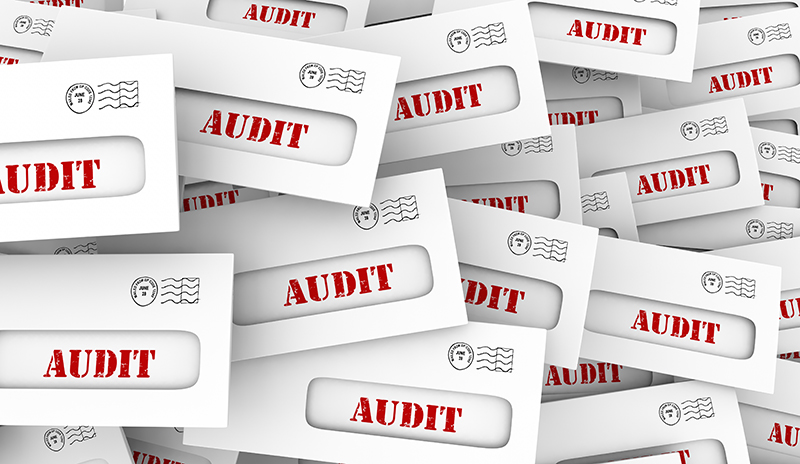What to do if you get an IRS Audit Notice
November, 05 2020 by Cheryl A.P. Patterson, EA, MSFS
Nothing like going through your mail to discover a letter addressed to you from the IRS or a state tax agency. Instantly your heart begins to race, your palms sweat, and you may decide to move it to the back of the pile hoping it is a mistake, scam, or will just magically disappear.
Avoid the temptation to ignore the notice. In most cases, the IRS or a state agency may only need additional information to finish processing your return, or they may be notifying you that you may have inadvertently underreported your income. State agencies typically mail notices resulting from the information they receive from the IRS or because of an adjustment that the IRS has made. This article focuses on the typical notices that the IRS sends out.
The most common types of notices issued by the IRS include the following:
LTR12C – This notice is issued to let a taxpayer know that the IRS needs additional information to finish processing the return. The IRS sends this notice so that the taxpayer does not have to formally amend their tax return. Some examples of why the IRS may send this type of notice include:
- To verify your identity and that you were the one who prepared the return
- To reconcile the Premium Tax Credit (Form 1095A)
- To verify federal withholding or any additional payments made that may not have been reported on the return,
- To request schedules. Often (whether you e-file or mail in your original return), schedules come up missing, so the IRS requests them again. Examples of the type of schedules include:
- A, Itemized Deductions,
- B, Interest and Dividends,
- C, Profit or Loss from Business,
- D, Capital Gains and Losses,
- E. Supplemental Income and Loss from Rental Real Estate and Royalties
Form 3531 – This notice is typically issued because the IRS is missing a valid signature or requires proof of federal withholding and needs the information to finish processing your return. Another reason this type of notice is sent is that the social security numbers or legal name of the taxpayer reported on the submitted return does not match information received from the Social Security Administration.
CP23 or CP14 – These letters notify you that the estimated tax payments you reported on your tax return do not match what the IRS has recorded. Often, taxpayers inadvertently report their withholding as an additional payment, payroll tax or sales tax payments made, or payments made for a prior tax year. It is important that you only report the payments you made to cover your current year personal tax liability. If you used TurboTax, you may be able to determine what happened by looking at your Tax Payment Worksheet. Compare the payments/withholding you reported against what the IRS reflects on the notice to see where the differences are reflected.
Balance Due Notices – The IRS sends this notice if your return reflects a balance due or you are subject to various penalties, including a Failure to File, Late Payment, or Underpayment penalty. Some self-preparation tax software, such as TurboTax, will only calculate the Underpayment penalty if you owe more than $1,000 to the IRS.
Sometimes the IRS sends out notices that require the taxpayer to provide additional support. Below are some examples:
CP2501 – This notice lets the taxpayer know the information reported on their return does not match the IRS’s records.
- For example, when you sell a piece of property (rental or your personal residence) a Form 1099-S is issued. This provides the IRS information about the gross proceeds. It is necessary to report this sale within your tax return so that the IRS can determine if the sale caused a taxable event.
- If you hold any type of stock through a broker, a Form 1099-B is issued that reports interest or dividends earned and reinvested and the gross proceeds, including the cost basis, if available, of transactions involving stock sales or transfers.
CP2000 – This notice is sent when the IRS is unable to match the information reported to the IRS by a third party to what you reported on your tax return. Often, a taxpayer may receive a CP2000 because income reported to the IRS was not included on the filed return. Examples include sales of stock, retirement distributions, or education program payments. Sometimes they need to verify how an education credit (American Opportunity or Lifetime Learning Credit) was calculated. The IRS also sends this notice when they have a question regarding an adjustment to income such as student loan interest or a question on an itemized deduction claimed on the return. Examples of itemized deductions often questioned by the IRS may include mortgage interest, property taxes paid, and non-cash contributions made.
Audit Request / or LTR525 – There are different types of audit requests ranging from a correspondence, office, or field audit. If you run a business, other types of audits include payroll or sales tax audits that are conducted by different departments depending on the forms you file, i.e., quarterly payroll reports (Form 941) or monthly or quarterly sales tax reports. I will be addressing notices that are specific to the IRS.
- In a correspondence audit, the taxpayer and IRS conduct the audit by mail. The taxpayer will mail the requested documents to the IRS and receive the IRS’s determination by mail.
- In an office or field audit, it is necessary to meet with the auditor in person, either at their office or your home. Office or field audits can be very intense and intimidating, and a taxpayer should (in most cases) be represented by a tax professional that has experience in these types of audits. The audit request can require support for a few items (as the case with a correspondence audit) or requiring support for every line item reported on your tax return.
 And the most terrifying of all notices – the Notice of Deficiency – is sent by certified mail.
And the most terrifying of all notices – the Notice of Deficiency – is sent by certified mail.
This is the final notice that the IRS will send out if they did not receive a response to a CP2000 or Audit Request, or you could not come to an agreement with a previous notice. You have 90 days from the date listed on the notice to present support for your position. If time is slipping away and you have had no response from the IRS to the additional information sent, you may want to petition the Tax Court. Petitioning Tax Court allows you to have an independent appeals officer review your case to see if they agree with your position or, if you choose, to argue your case in court. If, by the end of the 90 days, you do not petition Tax Court and have not reached an agreement with the IRS, the proposed tax listed on the Notice of Deficiency will become due. The next notice you will receive is a bill for the tax due.
No matter what type of notice you receive (federal or state), open the envelope and avoid the temptation to put the correspondence aside to deal with later. Hopefully, you will remember that you purchased Audit Defense through TurboTax or separately through our website. If you have received a letter from the IRS or state tax agency, contact us immediately and let our team of experts review the notice and provide guidance. For those who already have a TaxAudit Audit Defense membership, please contact us as soon as possible through our secure Report an Audit page.





